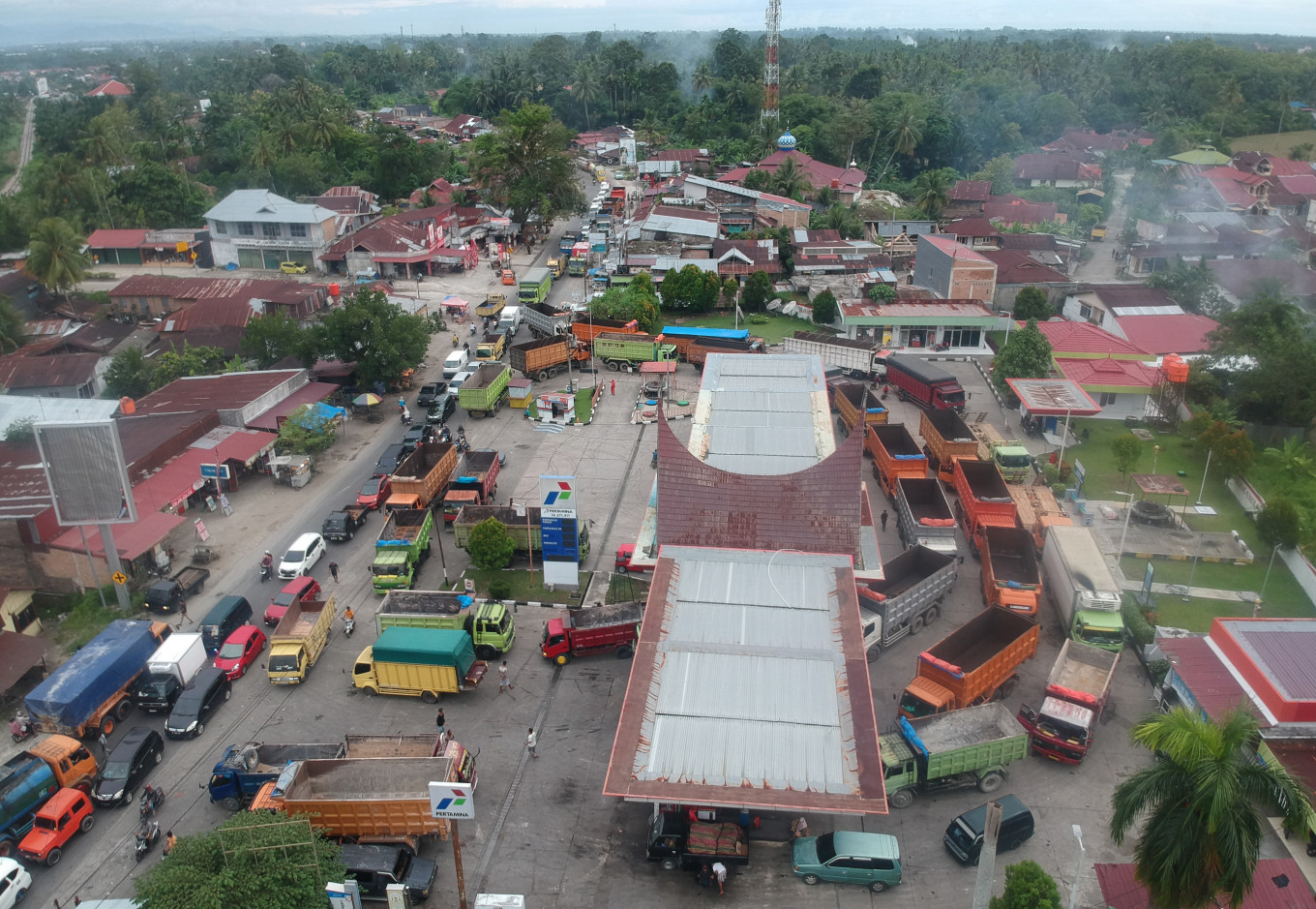Popular Reads
Top Results
Can't find what you're looking for?
View all search resultsPopular Reads
Top Results
Can't find what you're looking for?
View all search resultsIndonesia feels pinch of global oil crisis
Motorists have endured diesel shortages, seen prices rise in recent weeks.
Change text size
Gift Premium Articles
to Anyone
T
he sharp rise in global oil prices has crept onto Indonesian shores, with diesel shortages and fuel price hikes unfolding in some parts of the archipelago in recent weeks as the government winds down price control policies for the sake of fiscal consolidation.
Logistics firms have reported delivery delays because trucks are spending more time lining for Solar, subsidized diesel, at gas stations, particularly in Sumatra, Sulawesi and Kalimantan. Meanwhile, state-owned oil giant Pertamina raised the prices of all its unsubsidized gasoline and diesel brands, pushing some consumers to the more limited subsidized variants.
Furthermore, the government plans to gradually raise the prices of the subsidized Pertalite brand of gasoline and 3-kilogram liquefied petroleum gas (LPG), the most popular fuel brands in their respective categories, in the coming months.
“All [fuel prices] will go up. There are none that will not go up. So, we will do it gradually,” Coordinating Maritime Affairs and Investment Minister Luhut Binsar Pandjaitan said on Friday about the planned price hikes.
Read also: Govt plans gradual hikes for Pertalite, 3kg LPG
These developments mark the winding down of government energy price control policies meant to shield Indonesian consumers from the effects of surging oil prices amid a global economic recovery and the Russia-Ukraine war.
World crude oil benchmark Brent has exceeded US$100 per barrel, almost double the $63 per barrel assumption in the 2022 state budget, which had set aside Rp 134 trillion ($9.33 billion) for energy subsidies.
“Pertalite's price hike will have a huge direct impact on the people as it is [expected] to increase public transportation costs and staple food prices,” Mohammad Faisal, the Center of Reform on Economics (CORE) Indonesia executive director, said on Tuesday. “This will erode the lower middle class' purchasing power.”
The government had decided to ease price controls to minimize energy subsidy spending in achieving fiscal consolidation plans, which include reinstating a budget deficit cap of 3 percent of gross domestic product (GDP) by 2023. On top of subsidies, the government is obligated to compensate Pertamina for losses on certain sales and for subsidies from last year.
Pertamina started raising fuel prices on March 3 by targeting three types of nonsubsidized fuels, namely Pertamax Turbo, Dexlite and Pertamina Dex. These are the company’s priciest and highest grade fuels.
A month later, the company raised the unsubsidized Pertamax brand on Friday to a maximum of Rp 13,000 per liter from a previous maximum of Rp 9,400 per liter. This is the less pricey high-grade fuel. The company noted that the prices were still below the economic value of Rp 16,000 per liter.
Pertamina data shows that all these unsubsidized fuel brands contribute 17 percent of total gasoline and diesel consumption, with Pertamax being used the most. The remaining 83 percent comes from Solar and Pertalite.
Subsidized fuel oil ‘scarcity’
Pertalite consumption increased 10 to 15 percent as more consumers shifted to the subsidized fuel after Pertamax prices were raised, according to Pertamina fuel distributor subsidiary PT Pertamina Patra Niaga president director Alfian Nasution.
“We project the shift to last a few months. We will try to get back Pertamax consumers with [promotional] and educational programs,” he said in an interview with CNBC Indonesia on Monday.
Similarly, Pertamina partly blamed the subsidized diesel shortage on truck companies’ refusal to buy unsubsidized diesel brands after price hikes. Rising fuel demand amid an economic recovery, a lowered Solar quota for this year and unlawful distribution were other factors behind the shortage.
Read also: Subsidized diesel shortage hits freight haulage industry
“The rush of additional demand has the potential to create [Pertalite] shortages,” said energy expert Widhyawan Prawiraatmadja.
The Energy and Mineral Resources Ministry expects Pertalite demand to exceed the annual quota by 15 percent to 26.5 million kiloliters (kl) because of the shift in consumer demand.
Actual Pertalite distribution as of February has already reached 4.26 million kl, exceeding the February quota year-to-date (ytd) by 18.5 percent, according to the ministry.
“There can be an over-quota and a sharp rise in state budget strains,” economist Chatib Basri, a former finance minister, said in a Tweet on Friday of the Pertamax price hike.
‘Energy crises’ still far
Despite the price hikes and shortages, experts said that an energy crisis – defined as prolonged and systematic fuel oil scarcity – was still far away.
Reforminer Institute executive director Komaidi Notonegoro said absolute fuel oil supplies, when taking into account unsubsidized fuels, were still relatively secure. Nevertheless, concerns remain over Indonesia's fiscal capacity to provide subsidies or compensations for Pertamina.
“[Pertamina’s] financial health needs to also be considered,” he told the Post on Tuesday.
Concurring with Komaidi, Widhyawan said that fuel shortages had been “sporadic” in that shortages had only been reported for subsidized fuels and at gas stations in certain regions.
Institute for Essential Services Reform (IESR) executive director Fabby Tumiwa said distribution control to prevent Pertalite consumption from exceeding the annual quota and a mechanism to coax consumers to buy nonsubsidized fuels were critical.
“I don’t see [rising fuel prices] as an energy crisis considering what might be rare in several fuel filling stations are subsidized or assigned fuel. There's a quota for those,” he said.










